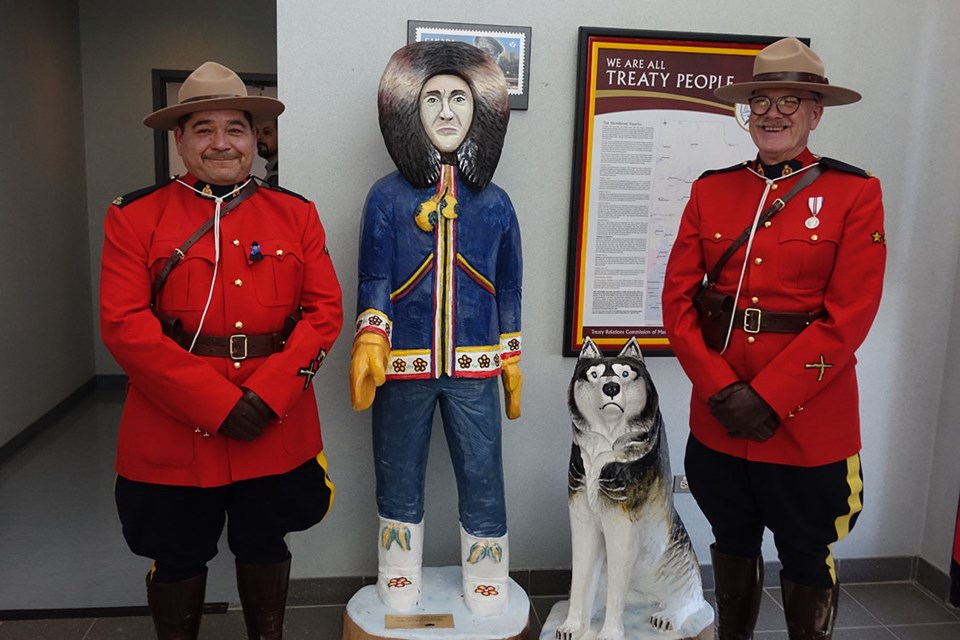The Thompson RCMP detachment unveiled a wood carving in its lobby that pays tribute to the contributions of Indigenous special constables at a ceremony on March 8.
Created by Rick Hall, the carving stands in the corner of the RCMP detachment’s lobby, which also features a poster acknowledging the Crown’s treaties with First Nations and a mural by an Indigenous artist.
“This particular tribute is dedicated to honouring the role that special constables played within the RCMP, said Manitoba RCMP North Ryan Mitchell shortly before unveiling the carving with the help of Manitoba Keewatinowi Okimakanak Grand Chief Garrison Settee. “When the police originally came to the north in the early 1890s, they lacked the skills and knowledge necessary to survive in such a harsh climate. Indigenous languages, cultures and the way of life were completely unfamiliar to most. Special constables were indigenous people hired to help the police adapt and survive in the north. The special constables and their families played a crucial role, working alongside the police in helping us understand indigenous cultures and traditions. Their skills and knowledge were crucial and, among other functions, often they acted as interpreters, scouts and guides.”
Mitchell, who oversees policing services in nearly all Manitoba communities north of the 55th parallel, with the exception of Opaskwayak Cree Nation, which has a First Nations police force, 24 of which are Indigenous communities, said the RCMP has done things in the past that have damaged the force’s relationships with Indigenous Peoples but that it is working to repair those relationships.
“It gives me great pleasure to stand here to witness the unveiling of this very magnificent monument to commemorate the service of our Indigenous special constables for many, many years,” said Settee. “It's an important step in reconciliation. And I think that when you take and embark on this journey, we want to walk with you. And we want to be able to be with you to take those initial steps, because I believe that we have a long way to go. But I think this is a very significant step. And for us at MKO, we're very appreciative of all the efforts that have been made by your members and also the efforts that you've made personally, because I've seen the level of commitment that you bring to reconciliation. We will continue to strive until we reach what we consider to be true reconciliation. Reconciliation is not a word. It's actions. It's going beyond rhetoric and action, making a difference. And I think that's what we want to do.”
Other recent actions Mitchell pointed to as part of the RCMP’s reconciliation work include adding Cree syllabics to Northern Manitoba members’ name tags that are embroidered on their regular service uniforms and developing a basic Cree language for law enforcement booklet for with the help of Northern Manitoba language consultants including Star Beardy, who was recognized for her efforts with the gift of a blanket at the March 8 ceremony.
“I'm living proof that residential schools didn't completely get rid of our languages,” Beardy said. “I speak my language and I credit that to my own community. I also want to acknowledge [RCMP Manitoba North District Staff Sgt.] Shayne [Smith] for all the work he's doing across Manitoba because I grew up being afraid of RCMP. It's given me a new perspective and my blood doesn't rise when I see a police car anymore.”




